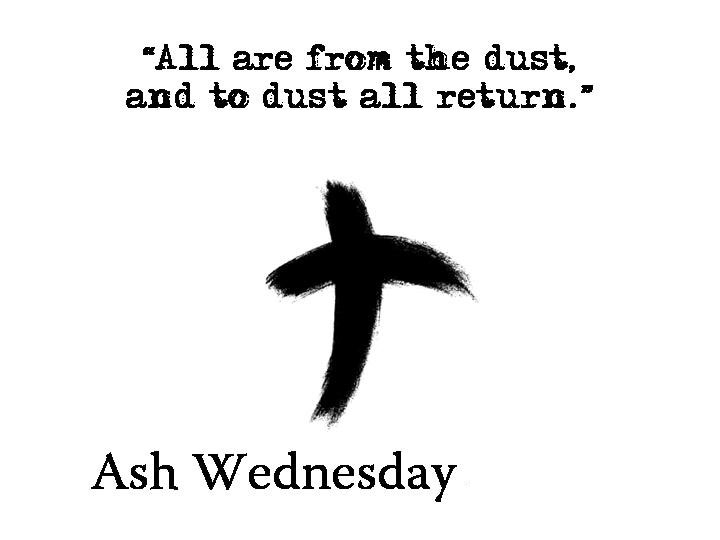Thought for Ash Wednesday
Today is Ash Wednesday. Most observant Catholics know that today is a day of fast and abstinence in the Universal Church, that means that we are to abstain from flesh meat today.
Feb 10, 2016

KOTA KINABALU: Today is Ash Wednesday. Most observant Catholics know that today is a day of fast and abstinence in the Universal Church, that means that we are to abstain from flesh meat today, and according to the present norms of the Church, our fast is to mean that we are allowed up to three small meals today, with two of them being supplemental (in other words, one larger “major” meal). However, many of us take the fast more purposefully and will only take one meal at all today, and that one very light. I’m not sure how things work in your parish today, but I know that at my own, the Mass today is one of the most well-attended of the year. I have never seen a crowd like the one that comes for the evening Mass on Ash Wednesday. It is wonderful to see so many come to Mass (and therefore I really hate pointing this out), but what makes that reality of the near-overflow crowd on Ash Wednesday so interesting is that as important as today is, attendance at Mass today is not obligatory. Today is not a Holy Day of Obligation, though there are those of us who personally believe that it should be and we treat it as though it is.
A big part of the reason for the overflow crowd in some parishes today is the imposition of ashes. Many other ecclesial communities distribute ashes today, Catholics aren’t the only ones who do, but it seems that we are the most well-known for doing so. You don’t have to be a Catholic to receive ashes on your forehead in a Catholic parish, just be a sinner. Since we are all sinners, today is a day when we are called to turn back with all of our hearts to God and to the work of his Kingdom. We are called back to God on a daily basis, but today the Church gives us a very public reminder. As sinners in the Scriptures were sometimes called to repentance “in sackcloth and ashes,” so we also recognise that call to conversion in a public way when we step forward and receive the ashes.
The other perhaps more important reality which the ashes remind us of is our own mortality. Some people today will hear the words “turn away from sin and be faithful to the Gospel when they receive the ashes. This is a fine reminder to us to return to the promises of our own baptism. However, I personally prefer the other formulary sometimes used when distributing ashes on Ash Wednesday, the more traditional “remember you are dust, and to the dust you shall return.” It is a quote from Genesis 3:19, which recounts the story of the fall when God threw Adam and Eve out of Eden for their disobedience:
“In the sweat of your face you shall eat bread till you return to the ground, for out of it you were taken; you are dust, and to dust you shall return.”
It is a reminder that we will see death as our first parents did. As St. Paul put it in 1 Corinthians 15:21-22:
“For as by a man came death, by a man has come also the resurrection of the dead. For as in Adam all die, so also in Christ shall all be made alive.”
Hence, the ashes are a powerful symbol of the death that comes due to sin, as well as dying to sin and repenting of it, as well as our receiving new life in Jesus Christ. They are a powerful symbol of faith.
Ash Wednesday marks the beginning of Lent. Many Catholics know that Lent is a season especially set aside for prayer, fasting, and almsgiving, and that it culminates in the Paschal Triduum (the commemoration of the Passion, Death, and Resurrection of Our Lord) and the Easter Season. In that spirit, many people “give up something for Lent.” It isn’t a bad idea, really, but it should be remembered that Lent is less about giving up things for the sake of giving them up and more about using this time to draw closer to God. If things are “given up,” they should be things that are keeping us from a deeper relationship with Christ and the Church. Lent is a time to ask ourselves what we can do to deepen our prayer life, our relationship with others, and what we do for the poor and the helpless in our midst. More than that, we are called to penance and conversion of life, and to use the 40 days of Lent to deepen that conversion, and to redouble our efforts to grow in our own faith in such a way that our Lenten observances will take root outside of Lent and become norms for a deeper spiritual life for us.
As we remember our own sinfulness and need for redemption today, let all of us pledge anew to remember the meaning, on multiple levels, of the ashes we receive today. In doing so, we can all remember that Lent isn’t just about giving things up, but about that continuing conversion to draw us ever closer to the Cross of Christ.--kkdiocese.net







Total Comments:0